University leaders in Australia and the UK have taken their first steps towards expanding higher education and research collaboration ahead of Brexit, holding high levels talks in London last week.
News and business analysis for Professionals in International Education
Have some pie!
Universities in UK, Australia push for deeper HE ties post-Brexit
 Parliament House, Canberra. Education cooperation has already featured in the Australian government’s FTAs with Singapore and China. Photo: flickr/longzheng
Parliament House, Canberra. Education cooperation has already featured in the Australian government’s FTAs with Singapore and China. Photo: flickr/longzheng With a potential bilateral free trade agreement on the cards after the UK’s exit from the EU, sector stakeholders are working to ensure that higher education and research are on the agenda for future negotiations.
“The focus is developing a very strong new energy in terms of our international collaboration”
On May 25, vice chancellors from both countries, the Australian High Commissioner to the UK Alexander Downer, and representatives from Universities UK, Universities UK International and Universities Scotland, met to put plans in motion for strengthening ties and identifying priorities for the sectors to work together.
Representatives from this newly-formed advisory group spoke to The PIE News after the meeting.
“The focus for a number of vice chancellors is really developing a very strong new energy in terms of our international collaboration as a whole,” said Richard Williams, principal and vice chancellor of Heriot Watt University in Edinburgh.
The discussions, he added, are based on “the recognition that there’s great comparability in terms of the quality of the university provisions, the investment there’s been in research infrastructure, and of course a very long-standing collaboration in terms of academic staff and professional services”.
Further enhancing students and staff mobility will be high on the agenda, said Paul Wellings, vice chancellor and principal of Australia’s University of Wollongong.
The recognition of academic qualifications will also be a priority, he said. “And in particular, professional qualifications, to allow people who may well have trained in one country to experience work in another country, and to allow that effective mobility.”
Research collaboration will also form a significant part of the talks.
“One of the things that came out of the conversation was how do we get additionality to drive the economies of both Australia and the UK faster, as a result of linking some of those things together,” commented Wellings.
With the UK’s exit from the EU impending, the two sides also looked at bilateral collaboration from a broader diplomatic standpoint.
“The sectors, it’s fair to say from both countries, are keen that higher education and research be featured within that FTA,” said Alec Cameron, vice chancellor and chief executive at Aston University in the UK.
The meeting, he said, was “in some sense exploring the rationale, the importance of free trade in the context of the international education”.
“The sectors in both countries are keen that higher education and research be featured within that FTA”
Education cooperation is a significant chapter in the free trade agreement between Singapore and Australia, signed in 2003. The agreement includes working to foster student mobility and facilitating cooperation between government agencies and other bodies.
Similar measures were echoed in the 2015 China-Australia Free Trade Agreement (ChAFTA).
A Universities UK report has called for the government to prioritise higher education and research in trade agreement negotiations after the country leaves the EU.
However, while the FTA serves as the context for these bilateral discussions, Nicola Dandridge, chief executive of Universities UK, said this is not the sole focus.
The working group will identify areas where value can be added to “existing strong collaborations” between universities, as well as new synergies “that can have a transformational impact” on research quality and staff and student exchange, she said.
“It may be that that then is reflected in an FTA, or it may be that it doesn’t need to be,” she continued. “We’re driving it from the substance but aware of the context of the FTA.”
Cameron at Aston University added: “In some sense, [it is] the prospect in anticipation of an FTA as much as the FTA itself which is spurring the opportunity for greater collaboration.”
Building on last week’s dialogue, the group will put together a discussion paper to share with the boards of both Universities UK and Universities Australia and continue to engage with government agencies in London and Canberra.
“I think it’s quite clear through UUK that the vice chancellors in the UK, and indeed in Australia, are seeing and recognising the obvious leadership position that we need to take in order to demonstrate how we contribute to the economy, which we do of course in massive terms,” said Williams at Heriot Watt University.
“And ever more now, we need to come forward with some proposals to demonstrate that in the international arena.”
Still looking? Find by category:


